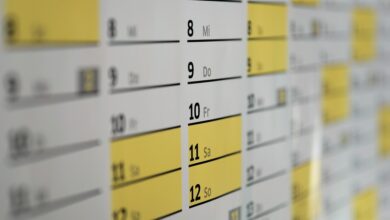
Planning for Success: How a Planner Can Drive Results in Every Aspect of Life
In today’s fast-paced world, where the demands of work, personal life, and various commitments can easily overwhelm us, having a strategic plan in place becomes crucial for achieving success. A planner, in this context, acts as a valuable tool that helps individuals organize their tasks, set goals, prioritize their time, and ultimately drive results in every aspect of life. Whether it be professional aspirations, personal growth, or a healthy work-life balance, a planner can be the key to unlocking potential and ensuring progress. In this article, we will explore how employing a planner can positively impact various areas of life and how to effectively navigate its usage.
First and foremost, a planner serves as a reliable roadmap towards achieving professional goals. In today’s competitive job market, strategic planning is essential for standing out and achieving career success. By meticulously outlining short-term and long-term objectives, a planner allows individuals to establish a clear path towards advancement. Setting achievable deadlines, breaking down complex tasks into smaller, manageable steps, and tracking progress helps maintain focus and motivation. Additionally, a planner aids in identifying potential obstacles and finding creative solutions, which can help minimize setbacks and maximize productivity. From preparing for important meetings to managing deadlines, a planner proves indispensable for professionals aiming to excel in their respective fields.
Beyond professional endeavors, a planner extends its benefits to personal growth as well. By allowing individuals to allocate time to personal hobbies, self-care, and skill development, it aids in achieving a well-rounded lifestyle. For instance, scheduling time for physical exercise, meditation, or pursuing a passion project fosters personal well-being, reduces stress, and enhances overall productivity. Moreover, by dedicating specific time slots for reading books, attending workshops, or acquiring new skills, individuals can continually broaden their horizons. A planner, through its consistent structure, ensures that unique goals and aspirations are given adequate attention, furthering personal growth and satisfaction.
In the context of maintaining a work-life balance, a planner plays a pivotal role in managing time effectively. With the ever-increasing demands of work and personal commitments, finding equilibrium can be challenging. However, a planner serves as a valuable tool in organizing priorities and allocating time for both personal and professional responsibilities. By blocking out dedicated slots for family activities, leisure, and quality time with loved ones, individuals can ensure that their personal life receives due attention without compromising work obligations. Similarly, by setting boundaries and effectively managing work-related tasks, the stress and exhaustion associated with overwhelming workloads can be mitigated. A planner empowers individuals to create harmony between work and personal life, avoiding burnout and fostering overall well-being.
While understanding the benefits of a planner is essential, using it efficiently is equally important. Here are some tips to make the most of this invaluable tool. Firstly, utilize long-term and short-term goal-setting techniques. Long-term goals act as guiding stars, providing a sense of direction and purpose. Break these larger goals into smaller, manageable milestones, making them easier to achieve. Secondly, maintain a structured routine by dedicating time to planning and reviewing tasks regularly. This acts as a compass that keeps one focused and accountable. Thirdly, prioritize tasks based on urgency and importance. By categorizing tasks into “urgent and important,” “important but not urgent,” and “urgent but not important,” one can effectively allocate time and energy accordingly.
To optimize planner usage, consider using various features available. Nowadays, digital planners and mobile applications can be convenient options to customize planning to individual needs. Features such as reminders, notifications, and syncing across devices can keep individuals informed and organized. Furthermore, explore using visual aids such as color coding, symbols, or graphs to enhance clarity and understanding. Experiment with different methodologies and find a system that suits personal preferences and style.
It is worth mentioning that employing a planner is not a guarantee of flawlessness or immunity to unexpected challenges. Life is unpredictable, and certain limitations may arise despite careful planning. However, having a planner ensures adaptability and provides a framework for addressing changes effectively. It allows individuals to analyze setbacks, adjust strategies, and keep moving forward with renewed determination. Moreover, a planner enables a proactive mindset, allowing space to anticipate future goals and objectives, rather than merely reacting to immediate circumstances.
In conclusion, the impact of planning, facilitated by the use of a planner, cannot be underestimated across all aspects of life. British psychologist Havelock Ellis once said, “Every success is based on the ability to do better than good enough,” and a planner offers the necessary tools to achieve just that. From driving professional progression, nurturing personal growth, to maintaining a healthy work-life balance, a planner acts as a catalyst for success. By embracing strategic planning, individuals can navigate the complexities of life with clarity, purpose, and ultimately drive results that exceed expectations. So, pick up a planner, unlock your true potential, and make every moment count on the journey towards success.





